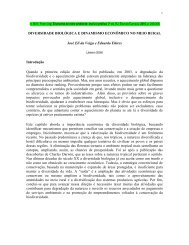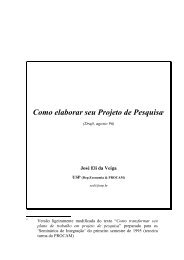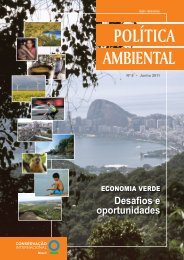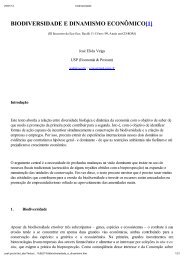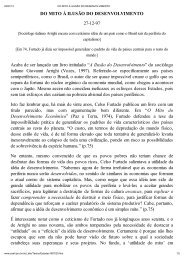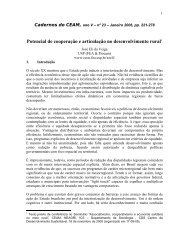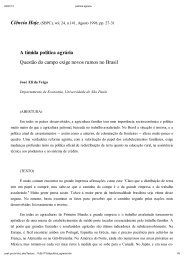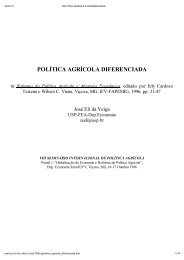sustainable development 20 years on from the ... - José Eli da Veiga
sustainable development 20 years on from the ... - José Eli da Veiga
sustainable development 20 years on from the ... - José Eli da Veiga
Create successful ePaper yourself
Turn your PDF publications into a flip-book with our unique Google optimized e-Paper software.
126<br />
Box II.7<br />
LATIN AMERICA AND THE CARIBBEAN: PROMOTION OF FOREST MANAGEMENT<br />
FOR NON-WOOD FOREST PRODUCTS – CASE STUDY IN BOYACÁ (COLOMBIA)<br />
The municipality of Ráquira, in Boyacá, is c<strong>on</strong>sidered Colombia’s craftwork capital and is famous for its clay crafts,<br />
as well as its hand-woven bags, baskets and hammocks and for pottery in general. It has 13,300 inhabitants of whom<br />
around 1,250 are craftworkers, and 75% of its ec<strong>on</strong>omy hinges <strong>on</strong> <strong>the</strong> craft trade. Of all <strong>the</strong> forest species recorded<br />
in <strong>the</strong> municipality of Ráquira (287), it was found that 46% have current or potential use and that <strong>the</strong> pottery trade<br />
uses 42 species for fuelwood and 19 species for crafts, including <strong>the</strong> lianas, Smilax floribun<strong>da</strong> and Smilax aff.<br />
tomentosa, and o<strong>the</strong>r species like Indigofera suffruticosa (indigo), used as a dye, and Juncus effusus (rush), used in<br />
basketwork. These species are priorities for <strong>the</strong> <str<strong>on</strong>g>development</str<strong>on</strong>g> of management plans relating to harvesting models and<br />
market research to ensure an ec<strong>on</strong>omic benefit for <strong>the</strong> regi<strong>on</strong>’s farmers and craftspeople (López, <str<strong>on</strong>g>20</str<strong>on</strong>g>06).<br />
Equally successful cases of local communities deriving enormous social and ec<strong>on</strong>omic benefit <strong>from</strong><br />
harvesting n<strong>on</strong>-wood products <strong>from</strong> forests can be found in o<strong>the</strong>r areas of Latin America and <strong>the</strong> Caribbean (<strong>on</strong>e<br />
such case is <strong>the</strong> Maya Biosphere Reserve in Guatemala, as reported by Mollinedo and o<strong>the</strong>rs, <str<strong>on</strong>g>20</str<strong>on</strong>g>01).<br />
Source: United Nati<strong>on</strong>s Envir<strong>on</strong>ment Programme (UNEP), Latin America and <strong>the</strong> Caribbean: Envir<strong>on</strong>ment Outlook, Panama<br />
City, <str<strong>on</strong>g>20</str<strong>on</strong>g>10. R. López, “Lista de especies vegetales vasculares registra<strong>da</strong>s en el municipio de Ráquira, Boyacá. Informe<br />
final”, Bogota, Instituto de Investigación de Recursos Biológicos Alexander v<strong>on</strong> Humboldt, <str<strong>on</strong>g>20</str<strong>on</strong>g>06; A.C. Mollinedo and<br />
o<strong>the</strong>rs, “Beneficios sociales y ec<strong>on</strong>ómicos del bosque en la Reserva de Biósfera Maya”, Revista forestal<br />
centroamericana, No. 34, <str<strong>on</strong>g>20</str<strong>on</strong>g>01, pp. 57–60.<br />
The ec<strong>on</strong>omic importance of forests goes far bey<strong>on</strong>d formal trade figures for forest products. On<br />
<strong>the</strong> <strong>on</strong>e hand, <strong>the</strong> ec<strong>on</strong>omic value of many of <strong>the</strong> products sourced <strong>from</strong> forests is included in agricultural<br />
accounts. On <strong>the</strong> o<strong>the</strong>r hand, c<strong>on</strong>venti<strong>on</strong>al statistics take no account of <strong>the</strong> great importance of various<br />
forest products and services for <strong>the</strong> survival and lifestyles of families and local communities, as well as<br />
for <strong>the</strong> local and global envir<strong>on</strong>ment (ecosystem resources account for about 89% of <strong>the</strong> income<br />
generated by some <str<strong>on</strong>g>20</str<strong>on</strong>g> milli<strong>on</strong> poor (TEEB, <str<strong>on</strong>g>20</str<strong>on</strong>g>10)). As menti<strong>on</strong>ed earlier, <strong>the</strong> regi<strong>on</strong> has great potential in<br />
innovative markets for payment for envir<strong>on</strong>mental services. Initiatives such as <strong>the</strong> World Bank Forest<br />
Carb<strong>on</strong> Partnership Facility and <strong>the</strong> United Nati<strong>on</strong>s Collaborative Programme <strong>on</strong> reducing Emissi<strong>on</strong>s<br />
<strong>from</strong> Deforestati<strong>on</strong> and Forest Degra<strong>da</strong>ti<strong>on</strong> in Developing Countries (UN-REDD) support countries in<br />
establishing payment mechanisms for forest envir<strong>on</strong>mental services. 10 Two examples of <strong>on</strong>going<br />
initiatives are Brazil’s Bolsa Floresta programme (Viana, <str<strong>on</strong>g>20</str<strong>on</strong>g>08) and Costa Rica’s payment for<br />
envir<strong>on</strong>mental services programme.<br />
Many of <strong>the</strong> regi<strong>on</strong>’s success stories have been limited to <strong>on</strong>e-off initiatives or relatively small<br />
areas. In many cases, a weak State presence in remote forest areas compounds problems of logistics,<br />
funding and technical capacity, hampering <strong>the</strong> implementati<strong>on</strong> of larger-scale, more effective measures.<br />
There is room for: <strong>the</strong> transfer of successful experiences; <strong>the</strong> widespread introducti<strong>on</strong> of models of<br />
participati<strong>on</strong> in forest management by civil society, communities and specific groups, such as women (see<br />
box II.8); and <strong>the</strong> use of technology tools such as informati<strong>on</strong> and communicati<strong>on</strong> technologies.<br />
An emerging issue is governance of <strong>the</strong> regi<strong>on</strong>’s forests to realize <strong>the</strong> potential of carb<strong>on</strong><br />
sequestrati<strong>on</strong>, including financing mechanisms for communities reliant <strong>on</strong> forest resources. Ano<strong>the</strong>r issue<br />
of increasing importance is upgrading <strong>the</strong> forestry industry by introducing <strong>the</strong> principles of efficiency,<br />
cleaner producti<strong>on</strong>, appropriate working c<strong>on</strong>diti<strong>on</strong>s, social benefits for <strong>the</strong> communities living in <strong>the</strong><br />
vicinity of forests and certificati<strong>on</strong> schemes accessible to small farmers.<br />
10<br />
See [<strong>on</strong>line] http://www.forestcarb<strong>on</strong>partnership.org/fcp/ and http://www.un-redd.org.



